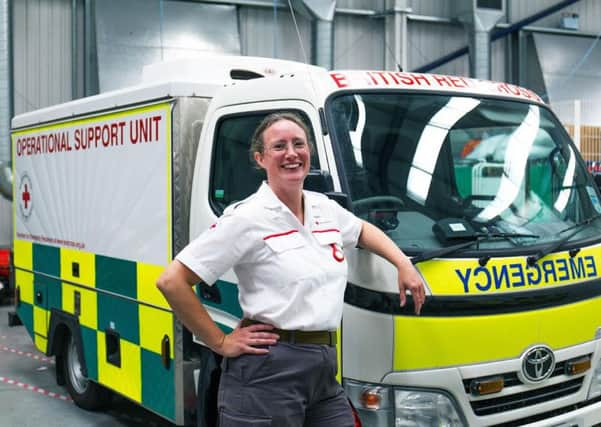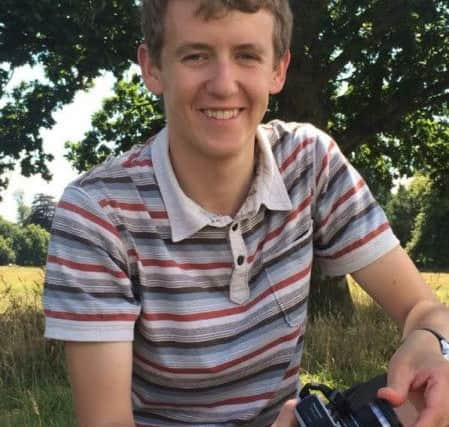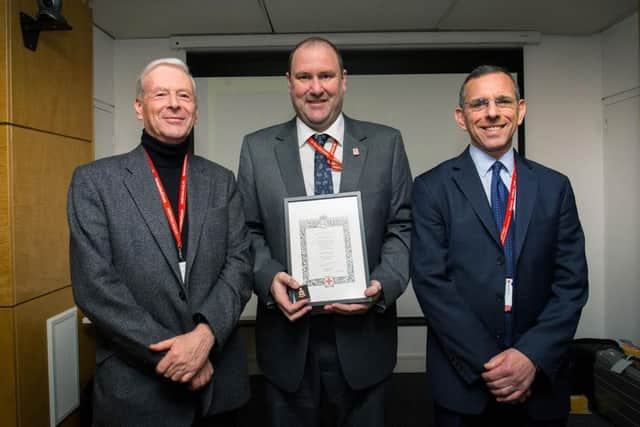Badly-burned airshow victim praises volunteers


Thomas Millburn, 23, from Worthing, had cycled along the A27 to take pictures of the airshow when the vintage Hawker Hunter jet hit the road.
Engulfed by the flames, which badly burned his body, he was treated by a Hastings Red Cross volunteer – who along with her 65 colleagues have been awarded the organisation’s prestigious Dunant award.
Advertisement
Hide AdAdvertisement
Hide AdThomas said: “I instinctively turned away from the impact and threw myself down on my front. A fireball engulfed me and I heard a weird noise like a gas barbecue lighting, a ‘whooshing’ of air.


“I could see the shadows of shrapnel flying around me and felt the heat. I thought something would hit me and I’d be killed, that these could be my last moments.
“Some small bits of debris had hit me on my back and leg, which felt a bit like hailstones. When everything stopped moving, there was an eerie silence. I got to my feet feeling shocked, and ran towards the airfield, away from the crash site – I was quite scared of seeing the fallout from the explosion.
“As I ran, I was shouting ‘can anyone do first aid?’. I realised I was quite badly burned on both hands, my arm, my leg and my back. Some people from the RAF began pouring water over me, and then the Red Cross first aiders came across the airfield to help me.”
Advertisement
Hide AdAdvertisement
Hide AdThomas was treated by Hastings volunteer Terry Alexander, who along with a colleague cooled the burns and covered them to prevent infection.


They stayed with him for two hours, as ambulances could not access the site during the immediate aftermath.
She said: “I thought he was an amazingly brave young man. I could see that he was badly burnt and could even tell by his injuries what position he had been in during the explosion.
“We cooled his burns with water and covered them to prevent infection. Thomas was in a lot of pain, which was actually a good sign – surface burns tend to be a lot more painful than full thickness burns.”
Advertisement
Hide AdAdvertisement
Hide AdThe road was eventually partially cleared, so the Red Cross team transported Thomas to a point where he could be taken to hospital by ambulance. He stayed there for ten days, but full recovery took a lot longer.
Thomas said: “I think the Red Cross team at the scene were very courageous. I wouldn’t have been able to do what they did, treating people who were so badly injured.”
Team of 66 recognised
SCORES of volunteers who supported casualties in the aftermath of the disaster have been recognised.
The team of 66 Red Cross volunteers have been awarded the Dunant award, in recognition of them going ‘above and beyond the call of duty’.
Advertisement
Hide AdAdvertisement
Hide AdMalcolm Allsopp, Red Cross operations director for Kent and Sussex, said: “We are very proud of the team, made up largely of volunteers, who responded at Shoreham. What was asked of them that day was well beyond what most of them had ever experienced, let alone on a first aid duty, but they acted with superb professionalism. They brought their training to bear when faced with some difficult injuries and very disturbing scenes.”
Tony Kemp, clinical lead in the Red Cross team, treated the critically-injured pilot in his ejector seat.
He worked alongside two doctors to save the pilot’s life and fought on when the plane caught fire.
He was awarded with the Special Service Cross, which recognises special acts of distinction or bravery.
Advertisement
Hide AdAdvertisement
Hide AdMr Kemp said: “In those first few minutes of the crash, the stillness and silence that occurred while people got organised was the height of professionalism.”
In the days that followed, Red Cross emergency support teams were on hand to assist the emergency and recovery teams conducting the painstaking work of clearing the site.
The Red Cross also established a telephone support line for anyone affected by the disaster, which took 30 calls over two weeks.
To find out more about volunteering with the Red Cross, call 0800 028 0831.